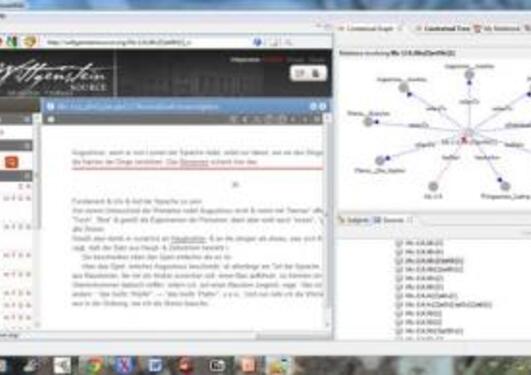Wittgenstein-Schlick-Scholz
In connection with a workshop on the editions of the writings of Ludwig Wittgenstein, Moritz Schlick, and Heinrich Scholz, the Philosophy and Text Technology Research Group is pleased to announce two guest lectures.

Main content
09.-09.15: Welcome and introduction
09.15-10.30: Niko Strobach and Monja Reinhart (University of Münster): "Scholz and Wittgenstein -- a long-term observation"
As far as we know, only two letters were exchanged between Ludwig Wittgenstein and the theologian, philosopher and mathematical logician Heinrich Scholz in connection with Scholz' Frege edition in 1936. However, Scholz was aware of Wittgenstein's influence on the Vienna circle, in particular on Moritz Schlick, whose colleague in Kiel he was at the beginning of the 1920s. New findings from Scholz' Nachlass in Münster show that he was quite familiar with Wittgenstein's early work. So a remarkable review of Wittgenstein's Philosophical Investigations, which appeared already in 1954, may be seen as a summary of a long-term observation from a distance. Like Russell, Scholz was completely unable to understand the importance of Wittgenstein's late work. No wonder: Using a distinction made by Arthur Prior, one may say that Scholz was a symbol-man and not an ordinary speech-man. Moreover, he was convinced of metaphysics as a worthwhile enterprise. Still, the review is a fascinating document of how the 70-year-old Scholz struggled with the text of the Philosophical Investigations. At the same time, Scholz sees that it is necessary to provide even the most basic information on Wittgenstein to the post-war German readers of/Philosophische Rundschau. Scholz' correspondence with von Wright and Georg Kreisel, also contained in the Nachlass, reveals how Scholz produced the review - torn between antipathy and shock on the one hand, and a strong sense of fairness on the other.
10:45-12:00 Martin Lemke (University of Rostock): "Schlick and Wittgenstein, a case study in constellation research"
Anyone dealing with the history of philosophy easily finds themselves in a dilemma between historically correct understanding and systematic relevance for the present. The method of constellational research can avoid this dilemma and its developers explicitly propose it for the Vienna Circle. In my lecture, I would like to use the relationship between Schlick and Wittgenstein as an example to show that this method will be fruitful for the Vienna Circle. To do this, however, constellation research must be combined with digital methods.

